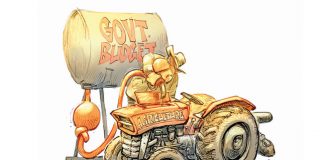Why are we all so biased? Do we all suffer from the ‘bandwagon bias’, which makes us always want to follow the herd? Or perhaps you suffer from the ‘optimism bias’, constantly expecting yields or profits that never materialise? The ‘pessimism bias’, which seems to afflict many South Africans, goes hand-in-hand with the ‘anchoring bias’, in which one isolated piece of information affects all decisions.
Psychologists have identified almost 200 different human biases. We all have them, and they affect our judgement and the quality of the decisions we make about our lives, our families and our businesses. Knowing and understanding our biases is the first step towards countering their negative effects.
This subject came to mind a few days ago as I listened to a typical South African doomsayer, a farmer (let’s call him John), bewailing the state of the country. To make matters worse, John makes no effort to keep himself informed. He suffers mainly from the ‘negativity bias’, a phenomenon whereby humans tend to have a greater recall of unpleasant memories than positive ones. John’s biases, along with a lack of realistic perspective, make for a potent brew of negativity and vitriol.
The positive reality
Right now, the eyes of the world are on Africa as one of the world’s promising investment destinations. The recent Third Annual Trading Africa Summit in Cape Town, themed ‘Africa – the hype, the myth, or reality?’, unpacked it all. Speaking about the opportunities opening up in Africa, successive speakers were glowing in their praise of changes taking place, while never denying the many challenges posed by operating on the continent.
I’m reminded of the sickening 2000 Economist cover, picturing a slovenly soldier carrying a rocket launcher, set against an outline of Africa titled ‘The Hopeless Continent’. By 2011, this picture of hopelessness had given way to a cover headlined ‘Africa Rising’. This year, an Economist cover stated: ‘Aspiring Africa’.
Speakers at the Africa Summit pointed out that International Monetary Fund forecasts have indicated that 11 of the 20 fastest- growing economies in the world, during the next five years, will be in Africa. Most leading economists also agree that despite the global economic slowdown in 2012, Africa remains one of the fastest-growing regions in the world.
Although the continent is highly fractured, with widely different prospects from country to country, one speaker pointed out that the economies of the continent’s six largest countries – South Africa, Nigeria, Egypt, Algeria, Angola and Morocco – were worth a combined US$1,3 trillion. International accreditation agency Standard and Poor’s has pointed out that the number of African countries with recognised international credit ratings has increased from five to 24 since 2000.
To all this should be added the recent World Economic Forum’s ranking of South Africa as the world’s leading country in terms of efficiency of financial services and private sector corporate governance. Not only is Africa seen as rising, but there is a global upsurge of interest from investors in food production. At last count, 10 investment funds are now dedicated to identifying and investing in viable agriculture projects in Africa. Shoprite has been quick off the mark in realising the potential and now has 130 stores operating outside South Africa.
Develop opportunities
All this represents a great African turnaround, and South Africa is the continent’s powerhouse and most highly-developed nation by far. We have roads and infrastructure that are the envy of Africa, people with knowledge of ‘the ways of Africa’, farmers with skill and experience, and entrepreneurs with tenacity and courage. But back to John – he sees none of this. Opportunity knocks and he complains about the noise.
As we break for the festive season, let’s reject the Johns of the world, shake off our biases and work at getting beyond our own petty day-to-day chores and worries to see the big picture. It’s a great time to be based in Africa, and it’s a great time to be involved in agriculture. There are legions of investors looking for viable opportunities to invest in. Let’s use 2014 to find and develop these, and build profitable farming and food production operations.
For presentations from the Trading Africa Summit, visit https://forms.thomsonreuters.com/trading_africa_summit.
The views expressed in our weekly opinion piece do not necessarily reflect those of Farmer’s Weekly.













